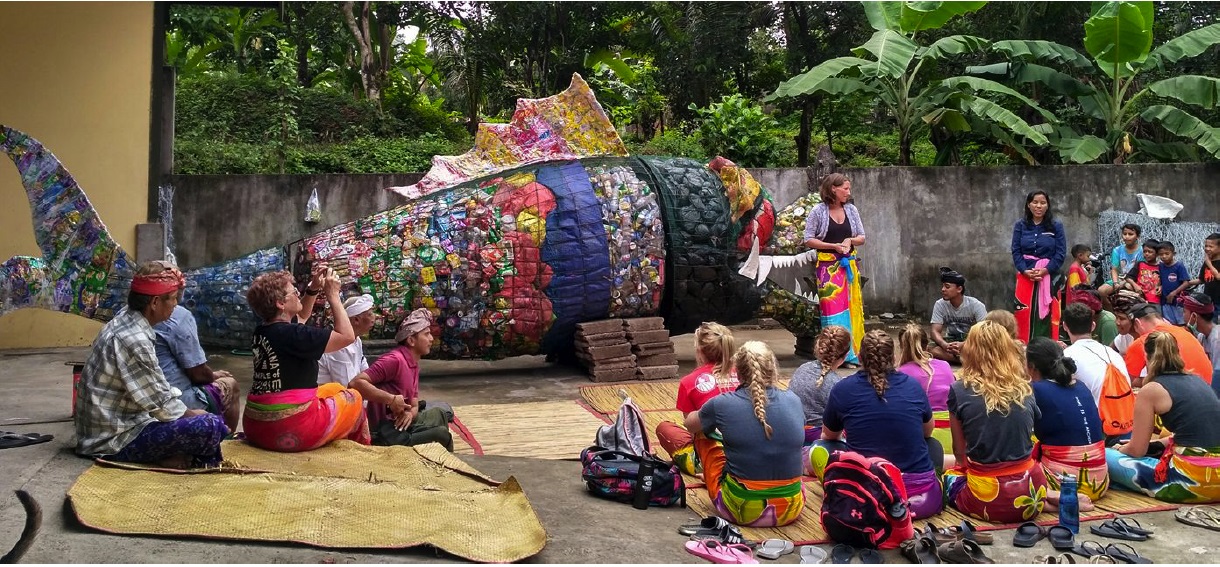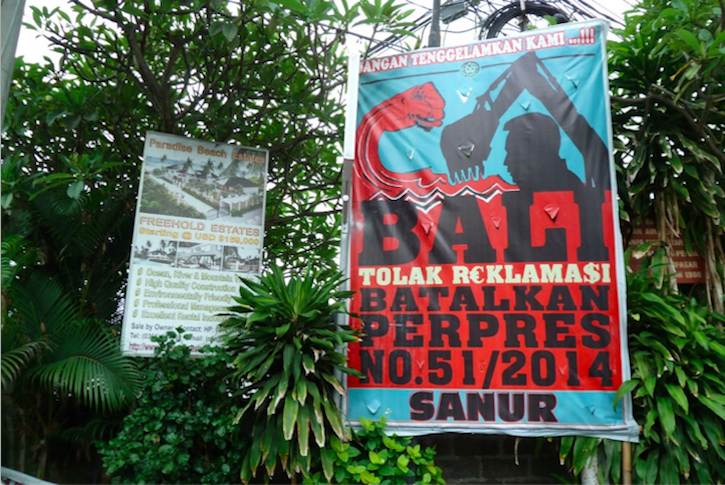Community programs in northern Bali are aiming to avoid negative impacts of tourism so evident in the south
Hannah Sutton
While tourism has sometimes been considered a mechanism for the alleviation of poverty or for environmental destruction, large-scale tourism can result in negative consequences for local communities. Previous ambitious tourism targets set by the Indonesian government have seriously affected Bali, often resulting in the displacement of local communities, water shortages, increased waste, the diversion of land from community needs and interests, unequal distribution of economic benefits, marine pollution, coastal erosion and more. The government’s current ambitions include seeing the tourism sector grow to reach eight per cent of GDP, and lifting the number of visitors to the country to 20 million annually by 2020 – a cause for concern for small communities in Bali.
Indonesia relies heavily on marine and coastal ecosystems for social, economic and environmental benefits and current tourism development models are encouraging short-term gains for individuals while undermining long-term sustainability.
As mainstream tourism creeps towards more remote villages in Bali, the small coastal community of Desa Les has come together to envision a different future. Well aware of the potential negative consequences of mainstream tourism, two local NGOs, Sea Communities and LINI (the Indonesian Nature Foundation), are employing alternative tourism models such as volunteer tourism and student volunteering in an effort to secure a healthier future.
This type of alternative tourism has the potential to alleviate environmental degradation and spread economic benefits more equitably than mainstream models. As the director of Sea Communities explains: ‘We are deliberate in what type of tourism we are developing. We want to avoid something like the south [of Bali], which is a party place. We want tourism that is more educational and involves the local community, rather than being foreign dominated.’
Such alternative forms of tourism promise to reduce destructive extraction from the environment and provide work for locals as tour guides, guesthouse operators or stall vendors to ‘develop’ sustainably.
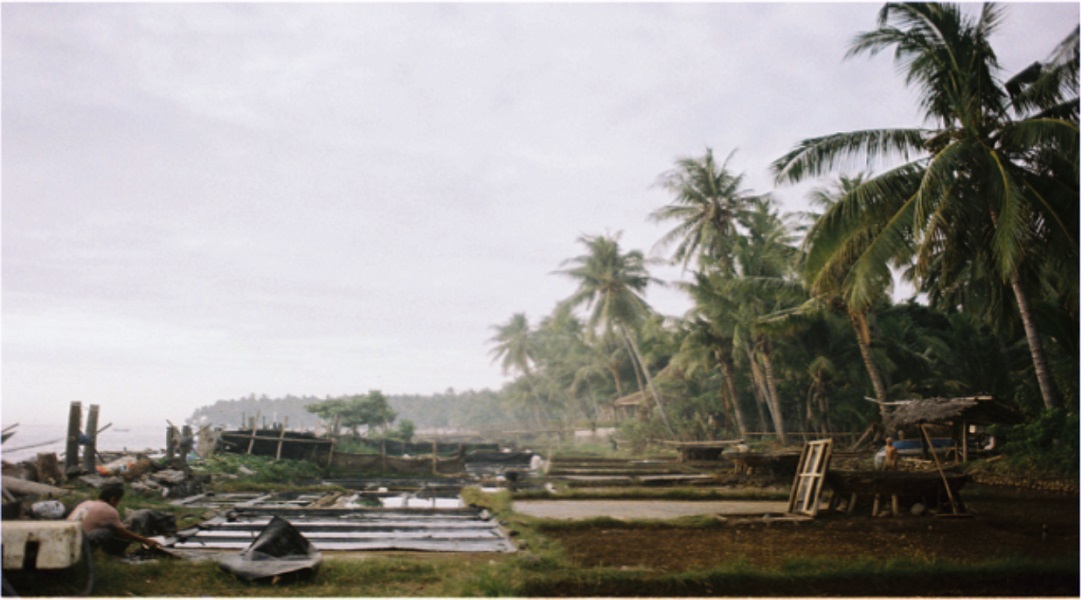
Mainstream tourism threat
Desa Les has not featured prominently on the Bali tourist map. However, signs of mainstream tourism in the area are emerging, with foreign investment increasing and plans being made to build a new airport in north Bali. The Desa Les community has expressed concerns about this spread of mainstream tourism. People have witnessed the difficulties that south Bali has experienced with the overdevelopment of the sector, with strains on resources such as electricity and water and an ever-increasing amount of waste. Additional concerns include increasing foreign land ownership, leading to gentrification and loss of community control.
One major concern for the director of LINI is land ownership trends: ‘many beachfronts are now owned by non-Les residents. There will be less land for the [next] generation.’ Similarly, the director of Sea Communities is concerned that ‘most of the villas here in Les are foreign [owned] and the guests don’t have much connection with the local community. We are hoping instead to attract more conscious tourists who want to help the community.’
As a remote fishing village, Desa Les already struggles with marine conservation problems and plastic pollution in their waterways. This affects local livelihoods. Belonging to the subdistrict of Tejakula, in Buleleng regency, Desa Les has around 7000 inhabitants who are mostly farmers or fishermen. Many of the fishermen are involved in the ornamental fish trade, supplying to various international markets. However, after years of destructive fishing using potassium cyanide, introduced by traders in the 1980s, the surrounding coral reef has died and fish stocks have declined rapidly. The direct exploitation of marine resources, habitat destruction and polluted water from litter and contaminated runoff all directly affect the livelihoods of those who rely on the marine ecosystem. In an effort to mitigate environmental and marine conservation concerns, and the threats of mainstream tourism influx, LINI and Sea Communities are hosting student and volunteer tourism programs.
Volunteers
Volunteer tourism and student volunteer programs are seen to answer to the ills of the mainstream tourism sector while assisting local and sustainable initiatives. The programs offer opportunities for meaningful volunteering experiences that also aim to benefit the community. LINI and Sea Communities host these programs with the intention of providing alternative sources of income to the community while focusing on restoring the marine ecosystem. The volunteer tourism programs host international volunteers from all around the world working on projects that include marine conservation and English education. The community also works with various international university groups from America and Australia focusing on conservation and community development programs. From this they intend to create a research hub. The students continue their academic learning whilst helping the community and ‘learning in the field’.
These forms of tourism allow the community to benefit from the income generated from hosting the volunteers or students, while supporting a conscious and deliberate tourism experience. They contribute to providing alternative income sources, supplementing local incomes through tourism jobs.
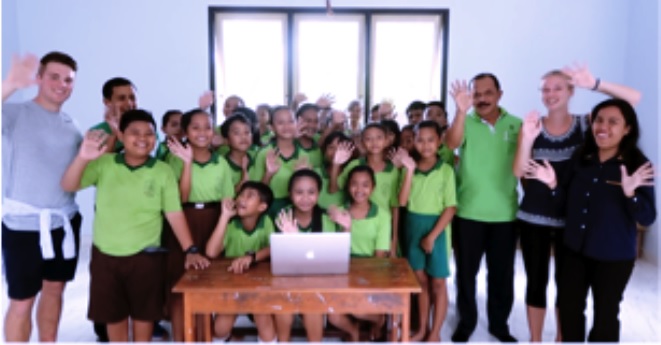
The programs diversify the local economy, creating more employment opportunities beyond fishing. At the height of the ornamental fishing trade there were 100 fishermen operating in the area; now there are only 20. Many have now secured alternative sources of income offered directly or indirectly through LINI or Sea Communities. One of the fishermen who has benefited from the programs is Gombal, who used to be an ornamental fisherman but was devastated to see the effects of fishing on the ocean. The use of potassium cyanide and dangerous methods of fishing such as compression diving was detrimental to both his own health and the marine environment. He is now a guest house owner, diving instructor and tour guide helping out at Sea Communities. As Gombal explains, ‘there are many, many benefits from volunteers. Before I didn’t speak any English and now I can speak a little bit and now we have friends from the community and we practice English together at nighttime with the volunteers. Also, when the volunteers come they bring money, and can stay in the homestays here and that helps others. They also transplant the coral to help the ocean and I am guiding the tourists so get extra pay. I have improved my skills and have more qualifications now, like open water and rescue diver [certificates]. The volunteers come here with big hearts and help the community.’
The programs promote entrepreneurship in the community, with locals offering services including cultural activities, accommodation, transportation and food. In 2017 alone, Sea Communities hosted over 215 volunteers, a figure achieved primarily due to the large number of student volunteers who have come through university programs.
LINI also hosts volunteer tourists and students as well as selling ‘sustainably bred’ ornamental fish through their aquaculture facility to the international market to help provide alternative sources of local income and attempt to influence consumer habits and ensure a more sustainable ornamental fish supply.
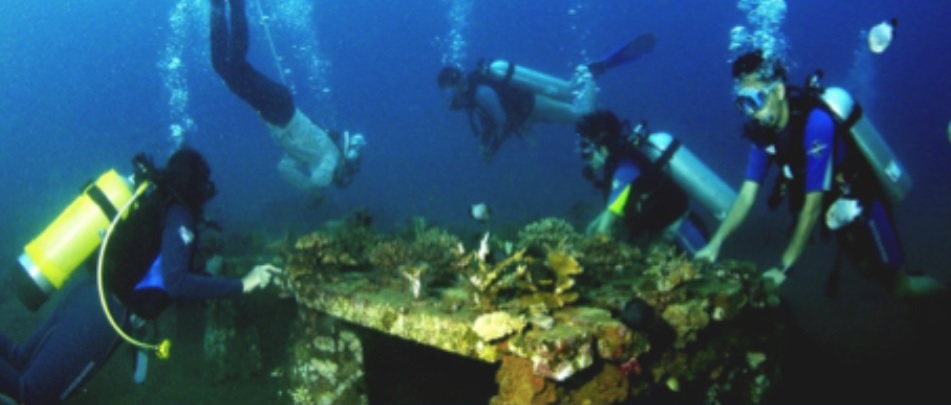
Same old traps
Of course, not all volunteer tourism or student programs around the world have been successful like those in Desa Les. Other programs have been criticised for various reasons, including fostering charity-centred relationships, having the potential to undermine local knowledge and customs, creating a community reliance on a program, and inequitable distribution of economic benefits leading to jealousy and resentment among community members. The notion that ‘solutions’ or ‘help’ can come from external sources (indeed, from students or volunteers) can undervalue communities’ existing knowledge, skills and expertise and assumes that western knowledge is superior. Without proper community consultation and integration the exchange can mirror existing power hierarchies that continue to undermine the hosts’ culture and environment in ways similar to that of conventional tourism.
Programs hosted in Desa Les are not without their limitations. They are not yet able to assist the entire community and unsustainable ornamental fishing still exists. Additionally, money from the volunteer programs can be concentrated in the hands of the main service providers, potentially contributing to economic inequalities. Yet, economic benefits are still able to reach the wider community and, with time, the existing organisations have the potential to grow the programs to spread the benefits further.
It is important for those engaging in volunteer tourism or student placements to carefully consider their choice of program and ensure it is designed to engage in community development projects that are both managed by and inclusive of the community. Conscious efforts should be made to ensure that benefits are being spread fairly throughout the community, such as staying in homestays and using community-run catering. Additionally volunteer tourism organisers or communities interested in hosting should be cautioned that while such programs may offer great benefits, there are still parallels with mainstream tourism. If programs are promoted without consideration of the carrying capacity of community and environment, or without plans for controlled growth, the community is at risk of establishing an exploitative and overdeveloped tourism industry, replicating the problems so evident in the south of Bali.
Hannah Sutton (hannahsutton9335@gmail.com) is a first class honours graduate in Anthropology and Asian Studies from Murdoch University. She conducted her field research in Desa Les.

